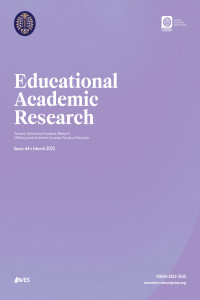KİMYA ÖĞRETMEN ADAYLARININ ÖĞRETMENLİK UYGULAMALARI VE DUYGUSAL ZEKÂLAR] ÜZERİNE BİR ÇALIŞMA
Duygusal zeka, öğretmenlik uygulaması, öğretmen adayı değerlendirme formu
___
- Acar, F.T. (2001). Duygusal zekd yeteneklerinin göreve I'e insana yönelik liderlik davramşları ile ilişkisi, İstanbul Üniversitesi, Sosyal Bilimler Enstitüsü, Doktora Tezi.
- Bar-On, R. (I 997). EQ-i Bar-On Emotional Quotienı Inventory. , MultiHealth Systems, Toronto, ON.
- Beceren. E. (2004). Duygusal Zekiı Nedir?, http://www.duygusalzeka.com.
- Feldman, K. A (1976). The superior college teacher from the studenı'">' view. Researeh in Higher Edueation, 5, (3), 243-288.
- Fumham, A,and Greaves, N. (1994). Gender and locus of control cOITelaleS ofbOOy image dissatisfaction. European Journal ofPersonality, 8, 3, 183200.
- Goleman, D. (1998). Working wirh emotional inıelligenee. New York; Bantam Books.
- Goleman, D. (2006). Duygusal Zekiı Neden lQ'dan Daha Önemlidir? 30. Baskı. çev. B. S. YükseL. Varlık Yayınları. İstanbuL.
- Grossman, M., Wood, W. (1993). Sex differences in inlensity of emotional experience: A social role interprelation. Journalaf PersonaUty and Social Psychology, 65,5.1010-22.
- Justice, M., and Espinoza, S. (2007). Emotional intelligence and beginning teacher candidates. Edueation, 127 no 4, p: 456-461.
- Lamport, M. A (1993). Student-faculty inforoıal internction and the effect on college student outcomes, Adolescence, 28 (112).971-991.
- Miller, N., Si1vennan. K., and Faik, F. R.(1994). Emotional development. intellectual abilily and gender. Journalfor ıhe Edueaıion ofthe Gifted 18. 1,20-38.
- Nelson, D. B and Nelson, K. W. (2003). Emotional Intelligence Skills: Significant factors in freshman achieveınent and relenıion. Paper presented at the American Counseling Association Conlerence (Anaheim, CA, March 21-25,2003).
- Parker, J. D. A., Summerfeldt, L. 1., Hogan, M. l., Majeski, S. A., (2004). Emotional intelligence and academic success: Examining the transition from high school to university, Personalit} lInd Individııaf D!tf"erence.l'. 36, 163-172.
- Pianta, R. C. (1999). Enhancing relationships bell-reen chi/dren and teachers. Washington, OC: American Psychology Association.
- Salovey, P. and Mayer, J. D. (1990). Emotional lnıeJ1igence, lmagination Cognition and Personality, 9,185-211.
- Stein, S. J. and Book, H. E. (2000). The EQ edge: cmolıonal intelligence and your success. Toronto, Canada: Stoddarto
- Sutarso, T., Baggett, L. K., Sutarso, P., Tapia, M.(1996). EfTecl of gender and GPA on emotional intelligence. Paper presented at the annual meeting of the Mid-South Edueatıonal Research Associalıon (Tuscalooosa, AL. November. 1996).
- Timm, .I. P. (1993). The refatlonship betH'een leacher.\" slme ofmind and the efJeclil'e climate in the classroom: implications for psydıology of mind as applied lo teacher education. Goddard College, Plainfeld, Vermont.
- Watkin, C. (2000). The leadership program for serving head teachers: Probably the word's largesI leadership development initiative. The feadeı~~hip ({nd organizational development Journal, 21, (1),13-19.
- Yüksel, M. (2006). Duygusal zekd ve performans ilişkisi (bir uygulama), Atatürk Üniversitesi, Sosyal Bilimler Enstitüsü, İşletme Anabilim Dalı, Yüksek Lisans Tezi
- Başlangıç: 2003
- Yayıncı: Atatürk Üniversitesi
İSVEÇ EĞİTİM SİSTEMİNİN İNCELENMESİ
TEXTES DE PROMOTJON POUR LES MANUELS DE FLE
KARŞILAŞTIRMALI EDEBİYAT ÇALIŞMALARININ YABANCI DİL EĞİTİMİNE KATKISINA YÖNELİK BİR UYGULAMA
MATEMATİK EĞİTİMİNİN GEREKLİLİĞİ VE ÖNEMİ
Ahmet IŞIK, Alper ÇİLTAŞ, Mehmet BEKDEMİR
MULTİMEDYA (ÇOKLU ORTAM) AKTİVİTELERİYLE "ÇANAKKALE ZAFERİ" KONUSUNUN ÖĞRETİMİ
OKUL ÖNCESİ DÖNEM ÇOCUKLARINDA GÖRÜLEN SORUNLARIN ÖĞRETMEN GÖRÜŞLERİNE GÖRE DEĞERLENDİRİLMESİ
Mehmet KÖK, Sinan KOÇYİĞİT, Mehmet Nur TUĞLUK, Erdal BAY
ORTAÖĞRETİM ÖĞRENCİLERİNİN "LİSE" VE "ÖĞRETMEN" KAVRAMLARINA YÜKLEDİKLERİ ANLAMLAR
RİSALE-İ TEVHİD (İNCELEME, METİN, DİZİN), AKÇAC YAYlNLARl
KİMYA ÖĞRETMEN ADAYLARININ ÖĞRETMENLİK UYGULAMALARI VE DUYGUSAL ZEKÂLAR] ÜZERİNE BİR ÇALIŞMA
Özge ÖZYALÇIN OSKAY, Özge ÖZYALÇIN OSKAY, Emine ERDEM, Ayhan YILMAZ, Ayhan YILMAZ
